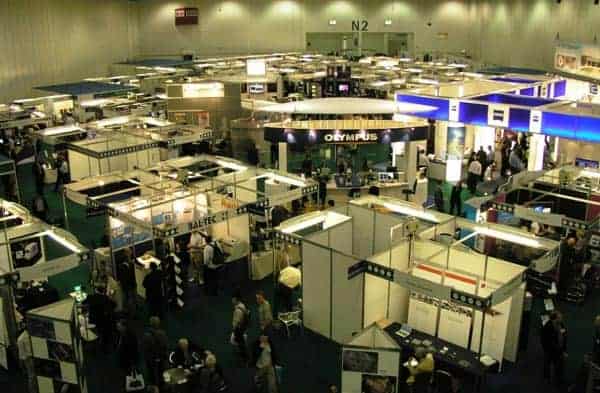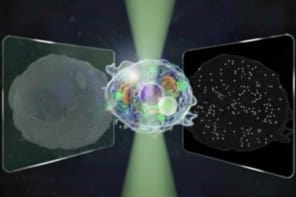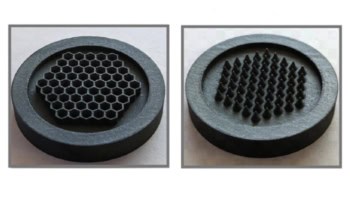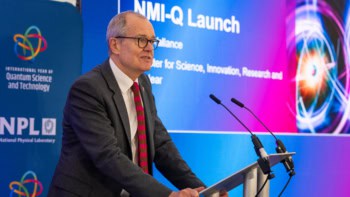Described as “Europe’s premier international conference and exhibition on the science of microscopy, imaging and analysis”, the Microscience 2008 conference and exhibition will be held on 23–28 June at ExCeL in London. Hamish Johnston gives a taste of what will be going on.

The event is organized by the UK-based Royal Microscopical Society (RMS), and will open with a plenary lecture from Sir David King, who was science and technology advisor to the UK government from 2000 to 2007 and is now director of the Smith School of Enterprise and the Environment at the University of Oxford. King, who is also professor of chemistry at the University of Cambridge will speak on “The 21st century challenges of sustainability and well being”.
Other plenary speakers include the Nobel laureate and nanotechnology pioneer Sir Harry Kroto, who will speak on “Mechanisms of self assembly at nanoscale dimensions”, on 25 June. Knut Urban — who is director of the Ernst Ruska-Centre (ER-C) for Microscopy and Spectroscopy with Electrons in Jülich, Germany — will deliver a lecture on aberration-corrected microscopy, also on 25 June.
The main programme of the conference is divided into three symposia that cover “Characterization and nanofabrication of advanced materials”; “Microscopy at the frontiers”; and “The cell in space and time”.
The advanced materials symposium includes sessions on in situ TEM and nanotechnology; advances in focussed ion beam microscopy; and nanopatterning and nanofabrication. Sessions on aberration-corrected electron microscopy and synchrotron-based microscopy will be included in the frontiers session. Not surprisingly, the cell in time and space will focus on biology and will include two sessions on “Imaging little to large: macromolecules to whole organisms”.
Free admission to exhibition
Microscience 2008 also includes a commercial exhibition that will feature close to 100 companies and admission to the exhibition alone is free. Participating firms include US-based Veeco Instruments, which will be introducing its HarmoniX atomic force microscope (AFM) at the event. JPK Instruments of Germany will be demonstrating its ForceRobot single-molecule force spectroscopy system, which is designed to make automated real-time studies of molecular interactions on nanometre length scales.
Among those firms showing off their latest optical instruments, Carl Zeiss of Germany will be exhibiting its new laser-scanning microscopes — the LSM 710 and LSM 710 NLO. Elsewhere in the exhibition, Canada’s Quorum Technologies will be introducing its Angstrom Grid Confocal System, which it touts as an alternative to laser-based confocal microscopes for examining fluorescent biological specimens. Other firms exhibiting at Microscience 2008 include the electron microscope makers FEI and JEOL UK and Hitachi.
Event organizers claim that a major attraction at the exhibition will be the RMS Learning Zone. This is a series of hands-on demonstrations covering four areas of microscopy: scanning electron microscopy; light microscopy; digital microscopy; and confocal microscopy. Participants will be able to meet experts in the respective fields and will receive a certificate of attendance.
The SEM portion of the Learning Zone will include a number of different instruments ranging from compact bench-top models to full-sized instruments. The microscopes are supplied by JEOL UK, FEI, Hitachi and Carl Zeiss and will be fully operational and ready to be used by exhibition visitors. This part of the Learning Zone will also feature two daily talks on how to prepare samples for analysis, followed by hands-on demonstrations. Participants are invited to bring their own samples for analysis.
The digital microscopy part of Learning Zone will include a number of workstations where participants can explore various methods including image capture; measuring morphometric and densitometric parameters; and the application of multi-dimensional imaging.
Optical microscopes supplied by Leica Microsystems, Meiji Techno, Olympus and Carl Zeiss will be available for use in the light microscopy area of the Learning Zone. Advice on both transmitted and refected light microscopy will be available from RMS experts.
The fourth Learning Zone will focus on confocal microscopy, and two instruments will be available for use — one supplied by Carl Zeiss and the other by Perkin Elmer. The microscopes will be used to demonstrate a range of techniques including multi-channel imaging, Z-stack formation and 3D/4D reconstruction.
Series of workshops
Microscience 2008 also includes a series of about 20 workshops organized by exhibiting companies. These include a session on multibeam imaging by JEOL UK and another on the geological applications of the SEM from Carl Zeiss. The Centre of Excellence in Metrology for Micro and Nano Technologies (CEMMNT) — a UK-based consortium comprising BAE Systems, Coventor, QinetiQ, the National Physical Laboratory and Taylor Hobson — will be running a workshop on how to link microscopy techniques to materials characterization methods. A workshop on creating 3D images over macroscopic scales — but at SEM resolutions — will be presented by Gatan UK.
The conference and exhibition both run over the full three days of the event, with the exhibition opening at 9:45 each morning.



